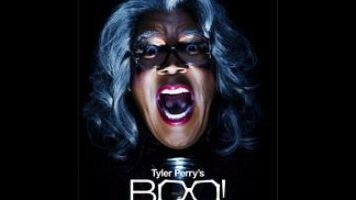You can say this for Tyler Perry: He earns his possessive credit. Perry writes, produces, directs, and stars in Tyler Perry’s Boo! A Madea Halloween, and he’s also the best part of it—at least in some of his guises. He once again plays Madea, the opinionated grandmotherly figure with a checkered past (and, based on her allusions to outstanding warrants, a checkered present), who flits in and out of his comedy-melodrama hybrids but has taken center stage for several of his straight comedies. Perry also plays Madea’s grumbly brother Joe, and though the characters can’t share the frame very often, they’re both pretty funny, rambling through their dialogue and landing on some inspired bits of hostility along with silly malapropisms.
As a comic filmmaker, Perry does not direct other actors particularly well—even including himself in a third recurring role as Brian, Joe’s long-suffering straight-man son. This clumsiness with any performers not doing overt shtick is probably why so many of the scenes with Madea and Joe are allowed to run on and on. Here he’s joined by Perry mainstays Cassi Davis and Patrice Lovely, also done up in old-age drag to play supporting crones who echo the Madea and Joe material. Meandering Judd Apatow-style improv runs have nothing on Tyler Perry, who often seems to start scenes early and allow his performers (himself in particular) to stroll into the narrative at their leisure.
The advertising materials for A Madea Halloween promise horror spoofery, and the movie takes so long to get going that it also takes a while to reveal that no such genre riffing will take place. It’s too bad, because putting Madea up against a typical horror movie slasher, if only for a few gags, could have been very funny. But her enemy in Boo! is similar to one of the nemeses she faced in Madea’s Witness Protection: mouthy, disrespectful teens. Early in the film, Brian’s 17-year-old daughter, Tiffany (Diamond White), sasses him when he has to work on Halloween night and demands that she stay with her mother or at least stay at home. When he leaves Madea and company in charge of Tiffany and her pious bestie, Aday (Liza Koshy), for the evening, the girls sneak out to attend a nearby frat party, incurring Madea’s wrath in a roundabout sort of way.
As a story, this is thin, repetitive, and tedious stuff. But it provides a fascinating glimpse into how Perry thinks frat boys sound (speaking mostly in poorly worded exposition; saying “epic” a lot), look (like 35-year-olds), and behave (traveling in actual, shoulder-linked packs), as well as what seems like his abiding fear of (and possibly contempt for) young people in general. Of the quartet of teenage girlfriends to which Tiffany belongs, only Aday is portrayed as not needing harsh tough-love behavior lessons, though she could use some syntactical training (“Why do they have to set the trends?” she robotically asks of their more popular friends, a line typical of Perry’s first-draft dramaturgy). Aday’s constant state of nervousness, played for mild laughs at first, is actually how Perry thinks teenagers should live—in fear of danger or adult disappointment.
It’s clearly a do-as-I-say-not-as-I-do situation. Although the running-gag references to Madea’s unseemly past are amusing, they also create a bizarre contradiction wherein a character that’s supposed to be beloved for speaking her mind is vociferously opposed to anyone under the age of 30 speaking theirs. As in Witness Protection, the very sound of a teenage girl talking back to her parent stirs up comically violent urges in Madea, and the new movie adds in a long scene extolling the virtues of beating children. This could be a pointed sociological observation, but the contradiction between stated morality and life as it’s actually lived is not one that Perry seems interested in exploring.
Although it ignores horror style beyond some generic foggy establishing shots and a genuinely creepy (and accidentally topical!) scene with a clown costume, the hectoring moral tone of A Madea Halloween turns out to be compatible with plenty of slasher movies, most clearly in the way Perry is hell-bent on punishing his young characters to the expected cheers of his target audience. Unlike a slasher picture, though, this movie’s prank-war payoffs don’t offer thrills or catharsis. A Madea Halloween has far more in common with a Halloween episode of a sitcom than a Halloween movie, and, if not for its 103-minute running time, would have even more in common with a skit performed by a church youth group on the Sunday before Halloween. Madea remains a distinctive, weirdly compelling character. Maybe someday Perry will make a good comedy for her.


 Keep scrolling for more great stories from A.V. Club.
Keep scrolling for more great stories from A.V. Club.